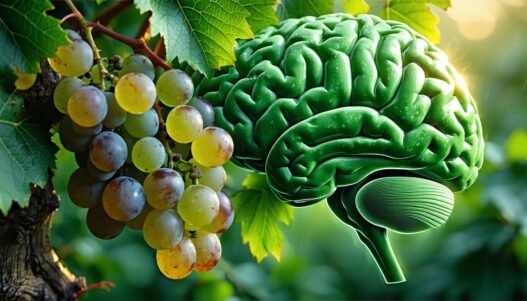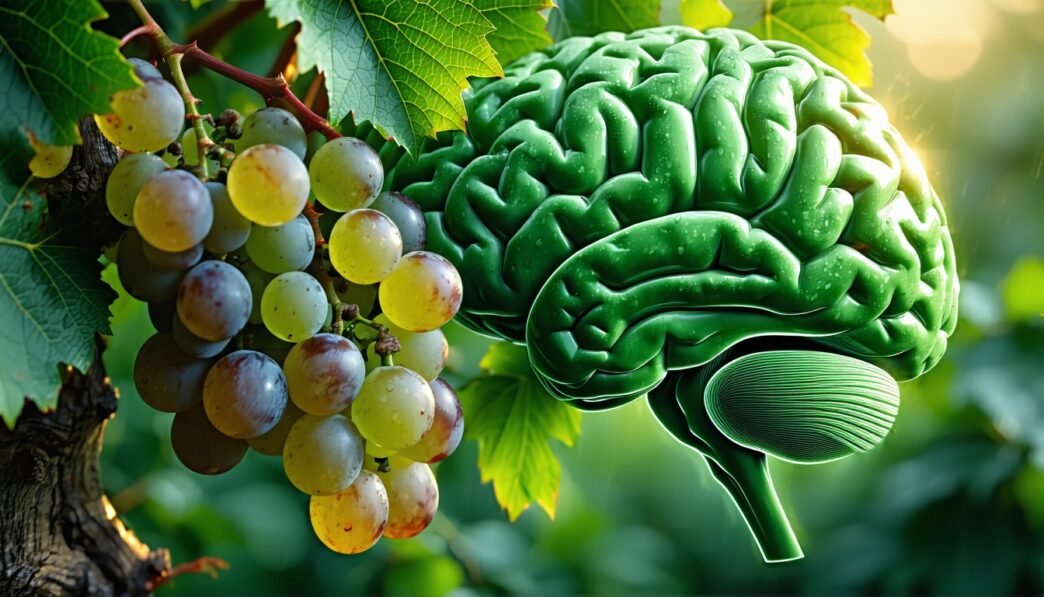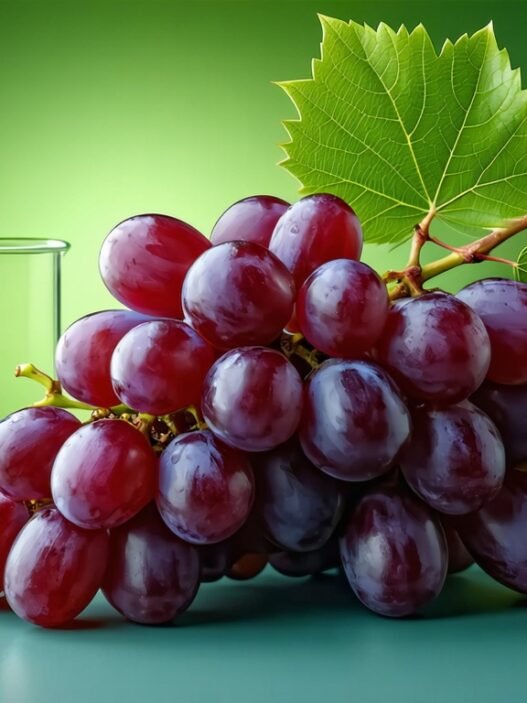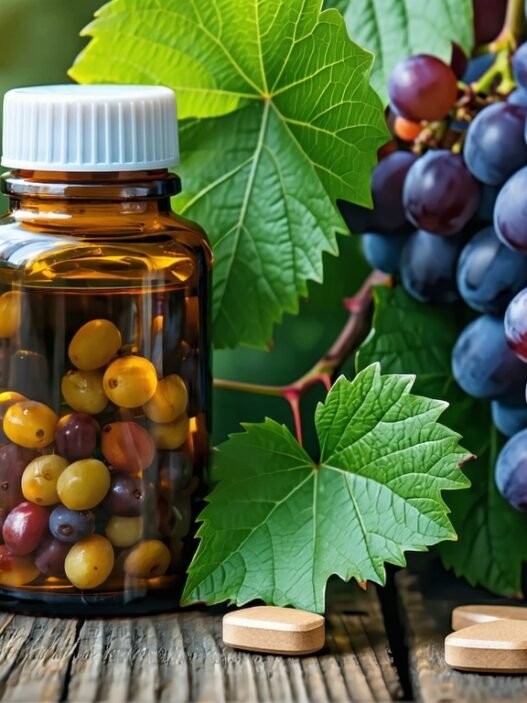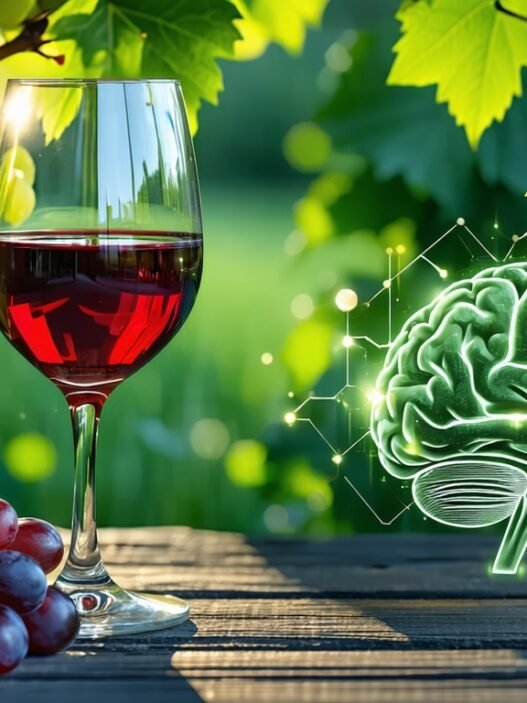Understanding Resveratrol
Introduction to Resveratrol
Resveratrol is a natural compound derived from red grapes, celebrated for its antioxidant properties. It is found in more than 70 plant species, predominantly within the skin and seeds of red grapes. This phytoalexin is synthesized by plants in response to mechanical injury, UV exposure, and fungal attacks, acting as a defense mechanism against pathogens such as bacteria and fungi (Medical News Today, NCBI). Resveratrol is increasingly recognized for its health benefits, particularly in supporting brain health and improving blood pressure regulation.
Sources of Resveratrol
There are multiple ways to incorporate resveratrol into one’s diet through both natural foods and supplements. The following table outlines common food sources of resveratrol:
| Food Source | Description |
|---|---|
| Red Grapes | Richest source; contains the highest levels. |
| Red Wine | Contains resveratrol derived from grape skins. |
| Blueberries | A healthy fruit option with moderate levels. |
| Cranberries | Another berry source offering beneficial compounds. |
| Pomegranates | Known for antioxidant properties, including resveratrol. |
| Juices (from above fruits) | Offers a concentrated source of the antioxidant. |
While foods can provide resveratrol, some individuals opt for resveratrol supplements to achieve higher concentrations. These supplements are frequently sought after due to their potential benefits, particularly for those looking to manage blood pressure and promote heart health (Medical News Today). For further information on the various benefits of resveratrol, including its role in longevity and anti-aging, visit our articles on resveratrol benefits and resveratrol and longevity.
Resveratrol’s Impact on Health
Resveratrol is increasingly recognized for its health benefits, particularly regarding renal function, endothelial function, and metabolic syndrome. These impacts can contribute to overall well-being, especially for those focused on longevity and anti-aging.
Renal Function Improvement
Recent research indicates that resveratrol may lead to mild improvements in renal function among the general adult population. A systematic review and meta-analysis conducted in 2023 found evidence supporting this claim, highlighting resveratrol’s potential role in kidney health.
| Study Type | Result |
|---|---|
| Systematic Review and Meta-Analysis | Mild improvement in renal function |
Endothelial Function Enhancement
Resveratrol’s impact on endothelial function is particularly significant. Research shows that supplementation can improve endothelial function and blood pressure in patients with metabolic syndrome and related disorders. This effect is supported by randomized controlled trials High Blood Press Cardiovasc Prev.
| Study Type | Result |
|---|---|
| Randomized Controlled Trial | Improved endothelial function and blood pressure |
Effect on Metabolic Syndrome
For individuals struggling with metabolic syndrome, resveratrol has shown promise in enhancing various health markers. A double-blind, randomized controlled trial investigated the effects of resveratrol on hepatic steatosis and cardiovascular indices in overweight individuals with type 2 diabetes. The findings suggest that resveratrol supplementation may provide critical benefits in managing metabolic syndrome.
| Study Type | Result |
|---|---|
| Double-Blind Randomized Controlled Trial | Positive effects on hepatic fat and cardiovascular indices |
The understanding of these health impacts underscores the importance of incorporating resveratrol into diets, particularly for those focused on maintaining health and preventing age-related declines. For more information on the benefits of resveratrol, check out our article on resveratrol benefits.
Resveratrol and Cognitive Function
As research into the potential health benefits of resveratrol continues to grow, its effects on cognitive function have drawn significant interest, particularly among longevity and anti-aging enthusiasts. This section discusses resveratrol’s impact on cognitive function in both elderly adults and young adults.
Cognitive Function in Elderly Adults
Cognitive decline is a significant concern for the aging population. Few effective therapies exist for improving cognitive performance in older adults. Studies have sought to explore whether resveratrol supplementation can provide cognitive benefits. A pilot study conducted in 2018 found that 90 days of resveratrol supplementation did not lead to significant improvements in cognitive function in elderly individuals.
Conversely, a study by Witte et al. demonstrated that when resveratrol was combined with quercetin, word retention improved significantly over a 26-week period in healthy older adults. Additionally, this combination enhanced resting-state functional connectivity between the hippocampus and other brain regions. These findings suggest that although individual resveratrol supplementation may show limited efficacy, its effects could be enhanced when paired with other compounds.
| Study Detail | Duration | Result |
|---|---|---|
| Witte et al. Study | 26 weeks | Significant improvement in word retention and connectivity in brain regions |
| 2018 Pilot Study | 90 days | No significant cognitive improvement observed |
Cognitive Benefits in Young Adults
Research has also explored the cognitive benefits of resveratrol in younger populations. Chronic resveratrol supplementation over a 28-day period has been linked to significant improvements in performance on cognitive tasks, specifically the N-Back test, which measures working memory and cognitive flexibility. These results denote resveratrol’s potential to enhance cognitive function not only in older adults but also in young adults.
Resveratrol may provide crucial support for maintaining cognitive health across different age groups, particularly as the global population ages. For individuals interested in incorporating resveratrol into their routine, whether through diet or resveratrol supplements, understanding its effects on cognitive function can aid in making informed health decisions.
Dosage and Safety of Resveratrol
Understanding the appropriate dosage and safety of resveratrol is essential for individuals interested in incorporating it into their health regimen, particularly for those focused on its potential benefits for brain health.
Safe Dosage Levels
Clinical trials indicate that it is technically safe to take resveratrol in doses of up to 5 grams per day. However, doses around 2.5 grams per day may lead to abdominal side effects such as cramping, flatulence, and nausea.
Table outlining dosage levels:
| Dosage Level | Potential Effects |
|---|---|
| Up to 5 grams | Generally safe |
| 2.5 grams | May cause mild side effects |
| 250-500 mg | Common in supplements but lower than effective research doses |
It’s important to note that while resveratrol found in foods is generally safe, individuals with specific health conditions, like bleeding disorders, should consult their healthcare provider before starting supplements.
Side Effects and Considerations
Research has not revealed any severe side effects from resveratrol even at high doses. Nonetheless, individuals allergic to grapes or wine may experience allergic reactions. As per the FDA’s stance, resveratrol supplements are not regulated, making it challenging for consumers to know the exact content and effectiveness of these products (WebMD).
Various supplements tend to contain dosages that are much lower than those effective in research studies. Most supplements range from 250 to 500 milligrams, while some studies recommending benefits used doses of 2 grams or more daily.
There are additional interactions to be mindful of. Resveratrol can influence drug transporters and metabolic enzymes, possibly affecting the metabolism of other medications. It may inhibit the CYP3A4 enzyme, which can lead to interactions with drugs such as HIV protease inhibitors and anti-arrhythmic agents (PubMed Central).
Experts generally do not recommend resveratrol supplements for anti-aging or disease prevention until more comprehensive research is conducted. Additionally, these supplements are not recommended for children, pregnant women, or breastfeeding mothers. For more information on the potential effects and benefits, you can explore resveratrol benefits or delve into specific topics like resveratrol for memory and resveratrol for heart health.
Resveratrol and Disease Prevention
Resveratrol is a powerful natural compound that has garnered attention for its potential in disease prevention, particularly in neuroprotection and anti-aging.
Neuroprotective Effects
Resveratrol exhibits notable neuroprotective effects which can be beneficial for maintaining brain health. This natural polyphenol, found in red wine and dark-skinned grape cultivars, helps attenuate hippocampal cell death and reduces intracellular reactive oxygen species, providing a protective barrier against excitotoxic brain damage (NCBI). In addition, evidence suggests that resveratrol may increase cerebral blood flow, which could positively influence psychomotor processing speed in individuals.
Preclinical studies indicate that resveratrol functions as an antioxidant by scavenging free radicals and suppressing pro-inflammatory enzyme activation. It also impacts various signaling pathways that are critical for cell survival, programmed cell death, and synaptic plasticity. Furthermore, resveratrol positively affects mitochondrial functions and promotes the clearance of β-amyloid peptides, which are implicated in neurodegenerative conditions.
The potential of resveratrol in combating neurodegenerative diseases such as Alzheimer’s, Huntington’s, and Parkinson’s makes it a compelling subject for further research (NCBI).
Anti-Aging Properties
The anti-aging properties of resveratrol have begun to attract considerable interest among longevity and anti-aging enthusiasts. Studies dating back to the 1990s have suggested that resveratrol might play a role in combating various diseases through its antiviral, anti-inflammatory, and anticancer effects (WebMD).
Researchers believe resveratrol may help mitigate heart disease risks by lowering LDL cholesterol levels, reducing inflammation, and inhibiting blood clots that can potentially lead to heart attacks. Furthermore, it may aid in preventing insulin resistance and related conditions such as diabetes.
As a result of these properties, resveratrol has been studied for its potential to enhance longevity and overall health. Individuals interested in incorporating resveratrol for brain health can explore options such as resveratrol supplements or resveratrol foods for a natural dietary source.
Both neuroprotective and anti-aging effects of resveratrol illustrate its significance in health management and disease prevention, highlighting the need for ongoing research and exploration of its many benefits.
Resveratrol and Clinical Trials
Research has increasingly focused on the benefits of resveratrol for cognitive function. Several clinical trials have highlighted its potential role in enhancing brain health, with promising findings in both young and elderly adults.
Studies on Cognitive Function
Clinical trials have reported significant cognitive improvements associated with resveratrol supplementation. One study indicated that chronic resveratrol supplementation for 28 days in young adults led to marked improvements in performance on the N-Back test, which is a measure used to assess working memory (NCBI).
Moreover, a research study demonstrated that resveratrol supplementation in obese and overweight older adults resulted in enhanced cognitive performance. Participants showed improved functional connectivity in the hippocampus and increased responsiveness in cerebral vasodilators, both essential for cognitive function, particularly in those facing cognitive decline.
A noteworthy trial by Witte et al. showed that combining resveratrol with quercetin improved word retention over a 26-week period among healthy older adults. The study also found increased resting-state functional connectivity between the hippocampus and other brain regions, demonstrating resveratrol’s cognitive potential.
Potential Therapeutic Benefits
Resveratrol demonstrates potential therapeutic benefits that extend beyond cognitive function. It has been suggested that it directly and/or indirectly activates sirtuins, a class of proteins associated with longevity and cognitive function. Enhancing sirtuin activity may attenuate cognitive impairments, particularly in conditions mimicking Alzheimer’s disease.
These findings suggest that resveratrol may offer a promising avenue for preventing cognitive declines associated with aging. It may also contribute to muscular and metabolic health, offering overall longevity benefits that align with the interests of individuals focused on anti-aging.
For those looking to explore further into resveratrol, including its general benefits, supplementation options, and dosage, consider visiting our articles on resveratrol benefits, resveratrol supplements, and resveratrol dosage.










